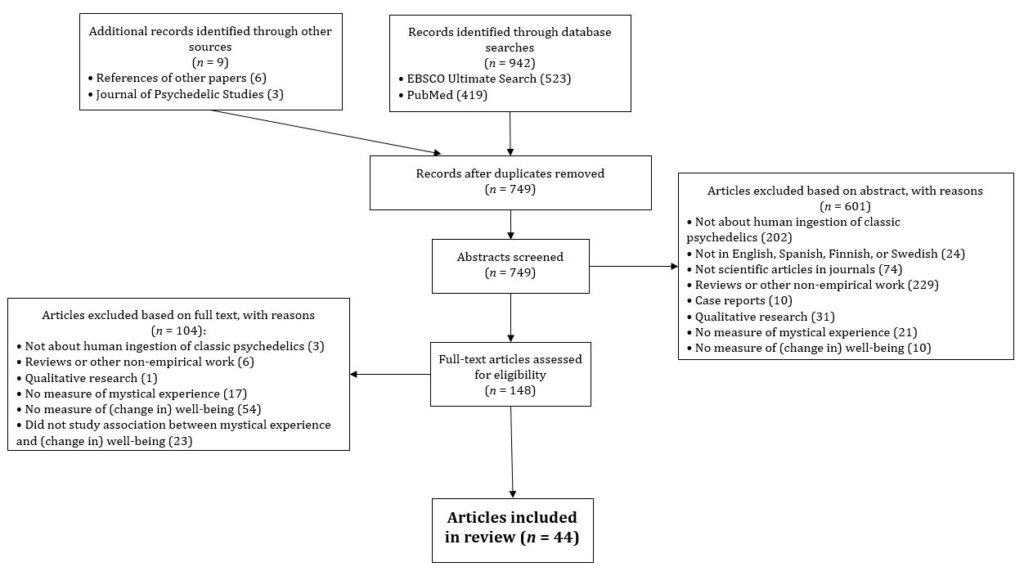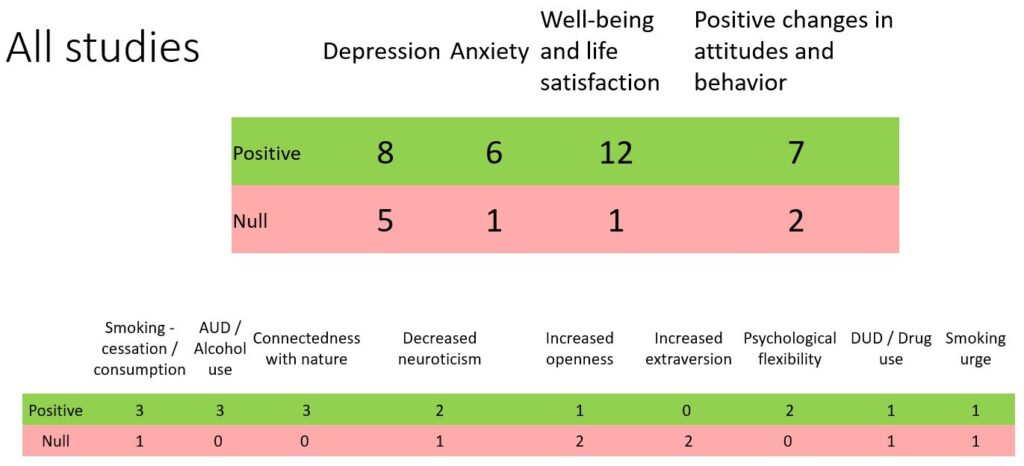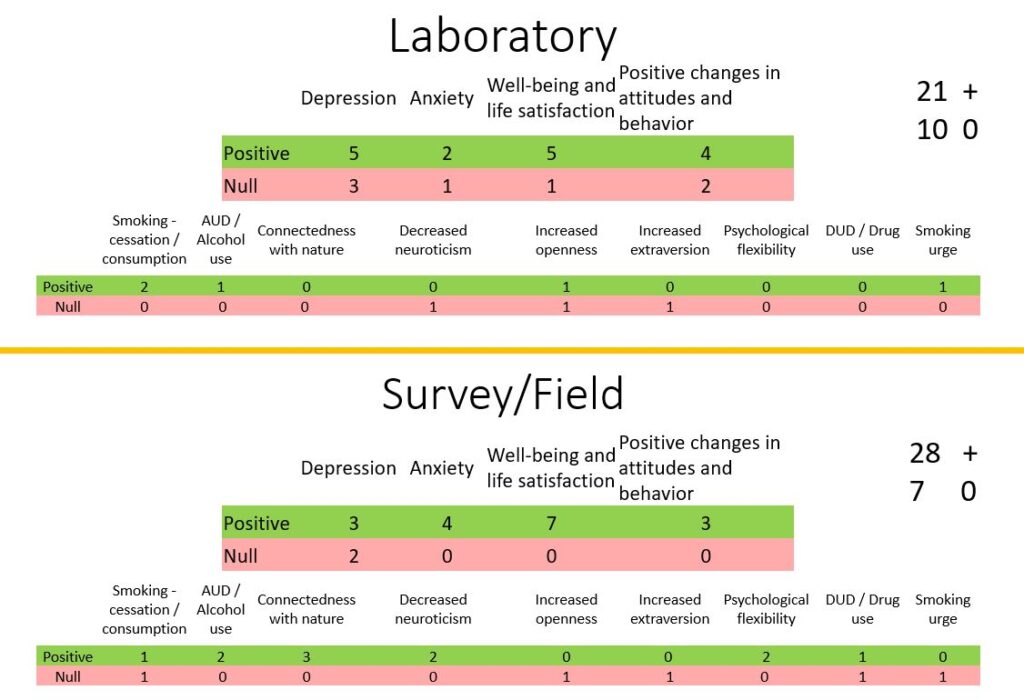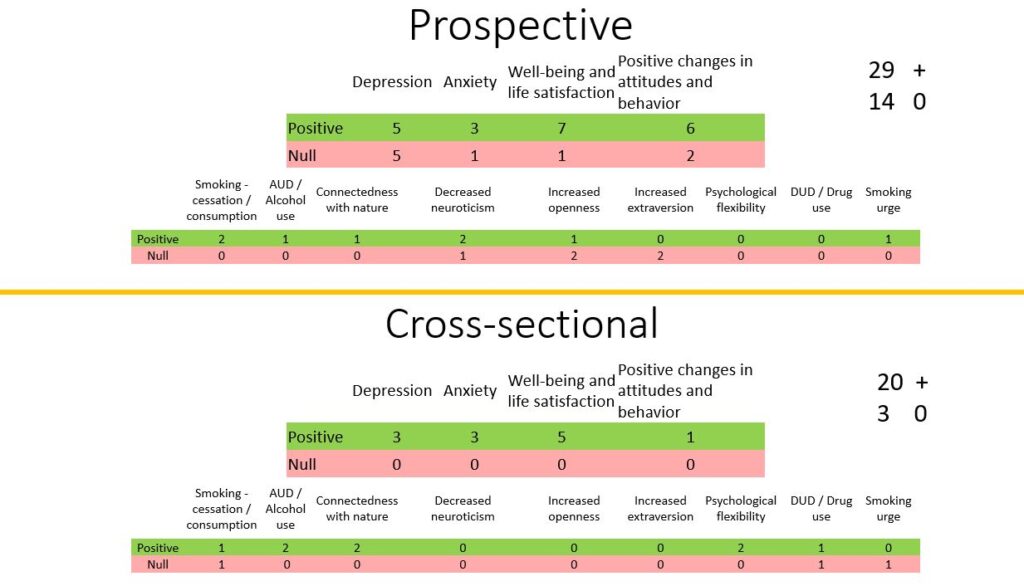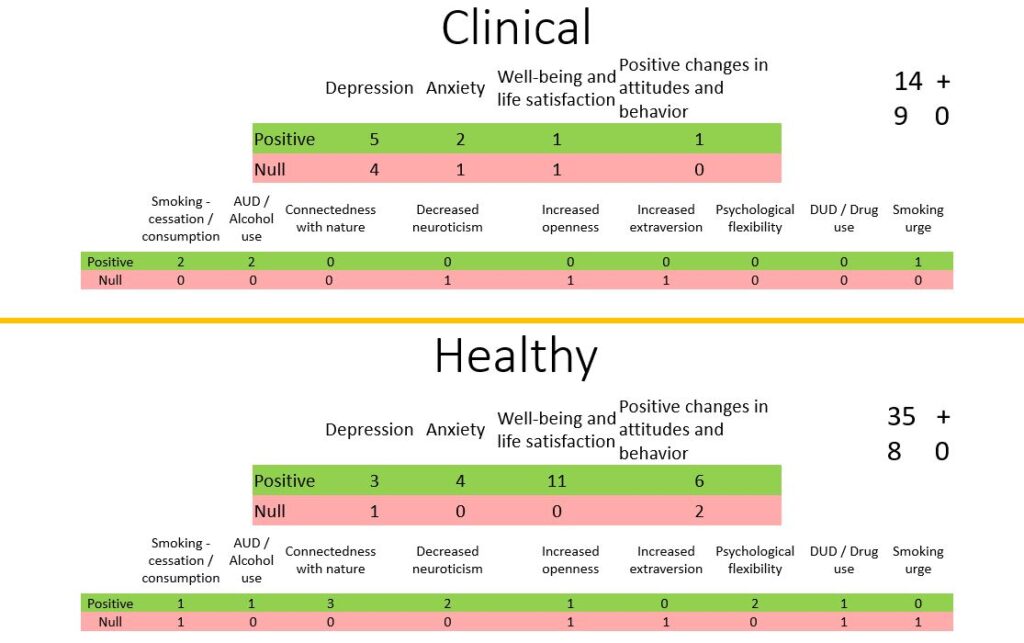This post provides a slightly extended version of and references for my brief talk at the Interdisciplinary Conference on Psychedelic Research 2022 on September 23, 2022. This research will also be published as a peer-reviewed article later.
2022-09-22 Samuli Kangaslampi, samuli@kangaslampi.net
Introduction
“[E]lements of the psychedelic experience, such as experiences of mystical-type, account for the therapeutic benefit” (Palhano-Fontes et al., 2019). “[M]ystical-type experiences are predictive of beneficial outcomes from psychedelics administered in experimental contexts” (Yaden & Griffiths, 2021). Statements such as these are commonly made in recent articles on psychedelics and their potential therapeutic effects, and are typically followed by some references to studies that have indeed found this to be the case. Meanwhile, other authors have questioned the relevance and meaning for therapeutic outcomes of the subjective effects entirely (Olson, 2021) or the concept of mystical experiences in particular (e.g., Sanders & Ziljmans, 2021).
So, what is the evidence that mystical-type experiences under psychedelics associate with or predict changes in well-being and mental health a) in general and b) compared with other possibly relevant acute subjective aspects of the experience (such as psychological insights and emotional breakthroughs)? To my knowledge, no comprehensive reviews on the state of the evidence have been presented1. Therefore, I conducted a comprehensive review based on a systematic search of the available quantitative evidence for such associations.
This blog post presents a rough, general summary of the results of this review to accompany my talk at ICPR 2022. A full, proper article will be published later.
Methods
This was a comprehensive review, based on a systematic search, of the published evidence on acute mystical-type experiences under the influence of psychedelics associating with or predicting (medium- or long-term) improvements in well-being or mental health after psychedelic use. The review included all types of studies from controlled trials with patients to surveys and field studies, and all aspects of well-being. As the review did not fulfill all the typical requirements for a systematic review, it is not named as such.
The review was pre-registered on the OSF before work on it began (https://doi.org/10.17605/OSF.IO/6TGBD).
The full inclusion criteria for studies to be included in the review were: 1) Peer-reviewed articles published in scientific journals, 2) in English, Spanish, Finnish, or Swedish, reporting on 3) empirical, quantitative research that measured the 4) level or intensity of mystical-type experience under the influence of 5) a psychoactive dose of a classic psychedelic and 6) changes in some aspect of well-being or mental health 7) from before to at least one week after the experience, and 8) analyzed the association between 4 and 6.
To identify suitable studies, PubMed and Academic Search Ultimate (EBSCO) databases were searched with the following search string: (myst* OR ego* OR oceanic* OR transcende* OR spirit* OR MEQ* OR HMS* OR HRS* OR SOCQ* OR 5D-ASC* OR 11D-ASC*) AND (psyched* OR LSD* OR lysergic* OR psiloc* OR ayahuasc* OR DMT* OR dimethyltrypt* OR mescal* OR peyot*). The reference lists of identified and other relevant articles, as well as all articles published in the Journal of Psychedelic Studies were further examined for additional studies. The Figure below presents the flow of identified studies and the number of studies excluded at each stage, with reasons.
A pre-defined data extraction form was used to extract bibliographic data and relevant data related to the study questions from all included studies. The findings were then narratively synthesized. No meta-analyses were performed.
Results
A total of 44 studies were identified. Of these,19 were based on laboratory research, 18 on surveys, and 7 on field studies. For purposes of comparison, survey and field studies were considered together, as in those studies, the dosing/doses and setting were not under the control of the study authors. 31 studies were prospective, meaning that they followed participants from before the psychedelic use to after it, while 13 were fully cross-sectional and retrospective. Notably, even in some prospective studies, changes in well-being or mental health were only assessed with retrospective questions. Regarding the particular psychedelic, 20 studies were on psilocybin, 7 on ayahuasca, one study on LSD, 5-MeO-DMT and mescaline each, while 14 included experience with other or any psychedelic. 14 studies reported on research with broadly clinical or “ill” populations, while 30 were conducted among “healthy” populations or populations with no confirmed diagnosis. Study samples ranged from 12 to 6877, with a median of 52 and standard deviation of 1147.
The studies reported on 76 associations between mystical-type experience and change in some aspect of well-being or mental health. In total, 56 of these associations were found to be positive to a statistically significant degree.
The studies analyzed changes in a wide variety of different aspects of well-being and mental health, which could be roughly divided into 18 categories: Depression (13 studies), anxiety (7), well-being and life satisfaction (13), positive changes in attitudes and behavior (9), smoking cessation / cigarette consumption (4), AUD / problematic alcohol use (3), connectedness with nature (3), decreased neuroticism (3), increased openness (3), increased extraversion (2), psychological flexibility (2), DUD / problematic drug use (2), smoking urge (2), PTSD (1), alcohol craving (1), alcohol abstinence self-efficacy (1), cigarette dependence (1), cigarette abstinence self-efficacy (1), meaningfulness / purpose (1), quality of life / optimism (1), spiritual well-being (1), connectedness (1), mindfulness (1).
The findings of the specific analyses were further simplified into positive, meaning a statistically significant association was found or null, meaning no statistically significant association was found. The table below presents the numbers of positive and null findings for association between mystical-type experience and change in all aspects of well-being or mental health that at least two included studies analyzed.
The review included many different types of studies. The first table below presents the findings dividing the studies into those conducted in the laboratory and those based on surveys or field work. In the next table, the studies are divided based on whether they were prospective or fully cross-sectional by nature. The final table presents the findings for studies on clinical populations vs. on healthy samples. Rates of positive vs. null findings were clearly higher for survey/field vs. laboratory studies, for cross-sectional vs. prospective studies, and for studies among healthy participants vs. in clinical samples.
Out of the 44 studies, 29 also analyzed the association between other aspects of the acute experience and changes in well-being or mental health. The other acute aspects were roughly divided into challenging experience / discomfort (association with change in well-being or mental health analyzed by 14 studies), psychological insights / insightfulness (10), overall intensity (9), visual/auditory effects (6), emotional breakthrough (4), dread of ego dissolution (3), overall / other features of alteration of consciousness (4), other 5.
Out of the more specific aspects, most were generally not found to associate with positive changes in well-being or mental health. However, psychological insights and emotional breakthroughs were found to be associated with positive changes in nine studies and four studies, respectively.
Few studies directly compared the degree of association or predictive power of mystical-type experiences and insights or emotional breakthroughs with changes in well-being or mental health, in terms of, e.g., including them in the same model or explicitly analyzing differences in correlations or regression coefficients.
Four studies directly compared mystical-type experiences and psychological insights in this way. Psychological insights or insightfulness were found to be a better / stronger predictor of decreased depression and anxiety in two survey studies (Agin-Liebes et al., 2021; Davis et al., 2020) and increased psychological flexibility in one (Davis et al., 2021). Both were similar predictors of improved well-being and life satisfaction in one very large survey study (Perkins et al., 2021). All these studies were among healthy participants.
Three studies directly compared emotional breakthroughs and mystical-type experiences. Emotional breakthrough was reported to be a better or the sole predictor of decreased depression in one clinical laboratory (Murphy et al., 2022) and one survey study (Nygart et al., 2021) among depressed individuals. However, both similarly predicted improved well-being and life satisfaction in one survey study among healthy participants (Roseman et al., 2019).
Discussion
Here, the findings of this review were only described at a rough, general level. A more detailed analysis of the strength of the evidence and the quality of the included studies will follow later.
Even so, we can already see that there is quite a bit of evidence for a link between acute mystical-type experience and self-reported change in some aspects of well-being and mental health from before until some time after psychedelic use. This evidence is clearest for changes in general well-being and life satisfaction, in positive changes in attitudes and behavior and in anxiety. For the first two of these categories especially, however, this evidence comes almost exclusively from studies with healthy individuals, not in clinical populations.
A major clinical application that psychedelics are being researched for is the treatment of depression. With this in mind, it is notable that the evidence for acute mystical-type experiences associating with improved depression is not as unequivocal. Several studies failed to find evidence for this link (Gukasyan et al., 2022; Nygart et al., 2022; Palhano-Fontes et al., 2019; Ruffell et al., 2022). Evidence for an association between acute mystical experience and positive change in personality is even less clear, with few studies and mixed findings.
The majority of studies did include some analyses regarding other acute aspects of the psychedelic experience as well. Most commonly challenging experiences or discomfort were analyzed, and generally not found to be associated with changes in well-being or mental health, or to be negatively associated with it. Aspects of the acute experience that have been suggested to be linked with improved well-being and mental health include psychological insights or insightfulness and emotional breakthroughs. A few studies did directly compare the association with or predictive power of mystical-type experiences vs. these other aspects. Based on this limited evidence, it does appear that insights and breakthroughs are at least as relevant for predicting improved well-being and mental health and may in fact be more relevant than mystical-type experiences.
Limitations
This review only considered evidence from explicit analyses presented in published studies. Accordingly, publication bias is likely to affect the findings in a major way. Many studies that did include both measures of mystical-type experience and change in aspects of well-being or mental health did not report the association between some or all of them. The same is true of other acute aspects of the experience. It seems likely that many null findings have not been reported.
The studies included in this review were also of highly varying quality in terms of the level of evidence they are able to provide. The two major issues are sample size and measures of change. Sample sizes were highly varied, and clearly the smaller, often clinical / laboratory, studies may not have been adequately powered to detect potentially meaningful associations. Further, especially in the category of change in general well-being and life satisfaction, many studies relied on single retrospective questions, even when the studies were otherwise prospective. Including several points of measurement before and after is always preferable and more reliable. Several studies were fully cross-sectional, conducted months or even years after the target psychedelic experience – the quality of evidence they provide is clearly lower, as both mystical experience and change in well-being or mental health are being simultaneously measured after the fact.
As regards the review overall, it is limited by only considering quantitative evidence. Qualitative research can and has already contributed to our understanding of what aspects of the acute psychedelic experience are relevant for therapeutic change (see, e.g., Breeksema et al., 2020). It is also limited by the inability to conduct quantitative meta-analysis. The highly varied outcomes and outcome measures, as well as the dissimilar study designs of the included studies, did not allow for meaningful meta-analysis.
Finally, this review relies on information about mystical-type experiences captured by a few particular questionnaire measures, most commonly the Mystical Experiences Questionnaire (Griffiths et al., 2006; Maclean et al., 2012). The question of whether these instruments truly and uniquely capture the level or degree of a phenomenon appropriately called a “mystical experience” is beyond my scope here.
Suggestions
Most analyses the included studies reported were exploratory. Pre-registration would increase our confidence in findings on acute mechanisms of the effects of psychedelics and is highly encouraged in future studies. It also ensures that all results, even null results, end up being published.
A large proportion of studies only included one aspect of the acute psychedelic experience, and few included direct comparisons between different potentially relevant aspects. Direct comparisons would be most valuable to identify what exactly it is about the psychedelic experience that is predictive for positive changes. General intensity of drug effects should always be considered, as well.
Footnotes
1 While preparing this work, a systematic review on the link between mystical experiences and therapeutic efficacy in clinical trials was published by Ko and colleagues (2022). That review differs from that presented here by only including clinical trials, and by also including trials with ketamine. Still, its findings are generally in line with what is presented here: Most studies do find a positive association, but are limited especially by their small and homogeneous samples.
General references
Breeksema, J. J., Niemeijer, A. R., Krediet, E., Vermetten, E., & Schoevers, R. A. (2020). Psychedelic Treatments for Psychiatric Disorders: A Systematic Review and Thematic Synthesis of Patient Experiences in Qualitative Studies. CNS Drugs, 34(9), 925–946. https://doi.org/10.1007/s40263-020-00748-y
Griffiths, R. R., Richards, W. A., McCann, U., & Jesse, R. (2006). Psilocybin can occasion mystical-type experiences having substantial and sustained personal meaning and spiritual significance. Psychopharmacology, 187(3), 268–283. https://doi.org/10.1007/s00213-006-0457-5
MacLean, K. A., Leoutsakos, J.-M. S., Johnson, M. W., & Griffiths, R. R. (2012). Factor Analysis of the Mystical Experience Questionnaire: A Study of Experiences Occasioned by the Hallucinogen Psilocybin. Journal for the Scientific Study of Religion, 51(4), 721–737. https://doi.org/10.1111/j.1468-5906.2012.01685.x
Ko, K., Knight, G., Rucker, J. J., & Cleare, A. J. (2022). Psychedelics, Mystical Experience, and Therapeutic Efficacy: A Systematic Review. Frontiers in Psychiatry, 13, 917199. https://doi.org/10.3389/fpsyt.2022.917199
Olson, D. E. (2021). The Subjective Effects of Psychedelics May Not Be Necessary for Their Enduring Therapeutic Effects. ACS Pharmacology & Translational Science, 4(2), 563–567. https://doi.org/10.1021/acsptsci.0c00192
Palhano-Fontes, F., Barreto, D., Onias, H., Andrade, K. C., Novaes, M. M., … Araújo, D. B. (2019). Rapid antidepressant effects of the psychedelic ayahuasca in treatment-resistant depression: A randomized placebo-controlled trial. Psychological Medicine, 49(4), 655–663. https://doi.org/10.1017/S0033291718001356
Sanders, J. W., & Zijlmans, J. (2021). Moving Past Mysticism in Psychedelic Science. ACS Pharmacology & Translational Science, acsptsci.1c00097. https://doi.org/10.1021/acsptsci.1c00097
Yaden, D. B., & Griffiths, R. R. (2021). The Subjective Effects of Psychedelics Are Necessary for Their Enduring Therapeutic Effects. ACS Pharmacology & Translational Science, 4(2), 568–572. https://doi.org/10.1021/acsptsci.0c00194
All studies included in review
Agin-Liebes, G., Haas, T. F., Lancelotta, R., Uthaug, M. V., Ramaekers, J. G., & Davis, A. K. (2021). Naturalistic Use of Mescaline Is Associated with Self-Reported Psychiatric Improvements and Enduring Positive Life Changes. ACS Pharmacology & Translational Science, 4(2), 543–552. https://doi.org/10.1021/acsptsci.1c00018
Agin-Liebes, G. I., Malone, T., Yalch, M. M., Mennenga, S. E., Ponté, K. L., Guss, J., Bossis, A. P., Grigsby, J., Fischer, S., & Ross, S. (2020). Long-term follow-up of psilocybin-assisted psychotherapy for psychiatric and existential distress in patients with life-threatening cancer. Journal of Psychopharmacology, 34(2), 155–166. https://doi.org/10.1177/0269881119897615
Barrett, F. S., Johnson, M. W., & Griffiths, R. R. (2015). Validation of the revised Mystical Experience Questionnaire in experimental sessions with psilocybin. Journal of Psychopharmacology, 29(11), 1182–1190. https://doi.org/10.1177/0269881115609019
Bogenschutz, M. P., Forcehimes, A. A., Pommy, J. A., Wilcox, C. E., Barbosa, P., & Strassman, R. J. (2015). Psilocybin-assisted treatment for alcohol dependence: A proof-of-concept study. Journal of Psychopharmacology, 29(3), 289–299. https://doi.org/10.1177/0269881114565144
Carhart-Harris, R. L., Bolstridge, M., Day, C. M. J., Rucker, J., Watts, R., Erritzoe, D. E., Kaelen, M., Giribaldi, B., Bloomfield, M., Pilling, S., Rickard, J. A., Forbes, B., Feilding, A., Taylor, D., Curran, H. V., & Nutt, D. J. (2018). Psilocybin with psychological support for treatment-resistant depression: Six-month follow-up. Psychopharmacology, 235(2), 399–408. https://doi.org/10.1007/s00213-017-4771-x
Daldegan-Bueno, D., Maia, L. O., Massarentti, C. M., & Tófoli, L. F. (2022). Ayahuasca and tobacco smoking cessation: Results from an online survey in Brazil. Psychopharmacology, 239(6), 1767–1782. https://doi.org/10.1007/s00213-022-06063-2
Davis, A. K., Barrett, F. S., & Griffiths, R. R. (2020). Psychological flexibility mediates the relations between acute psychedelic effects and subjective decreases in depression and anxiety. Journal of Contextual Behavioral Science, 15, 39–45. https://doi.org/10.1016/j.jcbs.2019.11.004
Davis, A. K., Barrett, F. S., So, S., Gukasyan, N., Swift, T. C., & Griffiths, R. R. (2021). Development of the Psychological Insight Questionnaire among a sample of people who have consumed psilocybin or LSD. Journal of Psychopharmacology, 35(4), 437–446. https://doi.org/10.1177/0269881120967878
Davis, A. K., So, S., Lancelotta, R., Barsuglia, J. P., & Griffiths, R. R. (2019). 5-methoxy- N,N -dimethyltryptamine (5-MeO-DMT) used in a naturalistic group setting is associated with unintended improvements in depression and anxiety. The American Journal of Drug and Alcohol Abuse, 45(2), 161–169. https://doi.org/10.1080/00952990.2018.1545024
Erritzoe, D., Roseman, L., Nour, M. M., MacLean, K., Kaelen, M., Nutt, D. J., & Carhart-Harris, R. L. (2018). Effects of psilocybin therapy on personality structure. Acta Psychiatrica Scandinavica, 138(5), 368–378. https://doi.org/10.1111/acps.12904
Fauvel, B., Kangaslampi, S., Strika-Bruneau, L., Roméo, B., & Piolino, P. (2022). Validation of a French Version of the Mystical Experience Questionnaire with Retrospective Reports of the Most Significant Psychedelic Experience among French Users. Journal of Psychoactive Drugs, 1–10. https://doi.org/10.1080/02791072.2022.2059796
Garcia-Romeu, A., Davis, A. K., Erowid, E., Erowid, F., Griffiths, R. R., & Johnson, M. W. (2020). Persisting Reductions in Cannabis, Opioid, and Stimulant Misuse After Naturalistic Psychedelic Use: An Online Survey. Frontiers in Psychiatry, 10, 955. https://doi.org/10.3389/fpsyt.2019.00955
Garcia-Romeu, A., Davis, A. K., Erowid, F., Erowid, E., Griffiths, R. R., & Johnson, M. W. (2019). Cessation and reduction in alcohol consumption and misuse after psychedelic use. Journal of Psychopharmacology, 33(9), 1088–1101. https://doi.org/10.1177/0269881119845793
Garcia-Romeu, A., Griffiths, R., & Johnson, M. (2015). Psilocybin-Occasioned Mystical Experiences in the Treatment of Tobacco Addiction. Current Drug Abuse Reviews, 7(3), 157–164. https://doi.org/10.2174/1874473708666150107121331
Griffiths, R. R., Johnson, M. W., Carducci, M. A., Umbricht, A., Richards, W. A., Richards, B. D., Cosimano, M. P., & Klinedinst, M. A. (2016). Psilocybin produces substantial and sustained decreases in depression and anxiety in patients with life-threatening cancer: A randomized double-blind trial. Journal of Psychopharmacology, 30(12), 1181–1197. https://doi.org/10.1177/0269881116675513
Griffiths, R. R., Johnson, M. W., Richards, W. A., Richards, B. D., Jesse, R., MacLean, K. A., Barrett, F. S., Cosimano, M. P., & Klinedinst, M. A. (2018). Psilocybin-occasioned mystical-type experience in combination with meditation and other spiritual practices produces enduring positive changes in psychological functioning and in trait measures of prosocial attitudes and behaviors. Journal of Psychopharmacology, 32(1), 49–69. https://doi.org/10.1177/0269881117731279
Gukasyan, N., Davis, A. K., Barrett, F. S., Cosimano, M. P., Sepeda, N. D., Johnson, M. W., & Griffiths, R. R. (2022). Efficacy and safety of psilocybin-assisted treatment for major depressive disorder: Prospective 12-month follow-up. Journal of Psychopharmacology, 36(2), 151–158. https://doi.org/10.1177/02698811211073759
Haijen, E. C. H. M., Kaelen, M., Roseman, L., Timmermann, C., Kettner, H., Russ, S., Nutt, D., Daws, R. E., Hampshire, A. D. G., Lorenz, R., & Carhart-Harris, R. L. (2018). Predicting Responses to Psychedelics: A Prospective Study. Frontiers in Pharmacology, 9, 897. https://doi.org/10.3389/fphar.2018.00897
Johnson, M. W., Garcia-Romeu, A., & Griffiths, R. R. (2017). Long-term follow-up of psilocybin-facilitated smoking cessation. The American Journal of Drug and Alcohol Abuse, 43(1), 55–60. https://doi.org/10.3109/00952990.2016.1170135
Johnson, M. W., Garcia-Romeu, A., Johnson, P. S., & Griffiths, R. R. (2017). An online survey of tobacco smoking cessation associated with naturalistic psychedelic use. Journal of Psychopharmacology, 31(7), 841–850. https://doi.org/10.1177/0269881116684335
Kangaslampi, S., Hausen, A., & Rauteenmaa, T. (2020). Mystical Experiences in Retrospective Reports of First Times Using a Psychedelic in Finland. Journal of Psychoactive Drugs, 52(4), 309–318. https://doi.org/10.1080/02791072.2020.1767321
Kettner, H., Gandy, S., Haijen, E. C. H. M., & Carhart-Harris, R. L. (2019). From Egoism to Ecoism: Psychedelics Increase Nature Relatedness in a State-Mediated and Context-Dependent Manner. International Journal of Environmental Research and Public Health, 16(24), 5147. https://doi.org/10.3390/ijerph16245147
Kiraga, M. K., Kuypers, K. P. C., Uthaug, M. V., Ramaekers, J. G., & Mason, N. L. (2022). Decreases in State and Trait Anxiety Post-psilocybin: A Naturalistic, Observational Study Among Retreat Attendees. Frontiers in Psychiatry, 13, 883869. https://doi.org/10.3389/fpsyt.2022.883869
MacLean, K. A., Johnson, M. W., & Griffiths, R. R. (2011). Mystical experiences occasioned by the hallucinogen psilocybin lead to increases in the personality domain of openness. Journal of Psychopharmacology, 25(11), 1453–1461. https://doi.org/10.1177/0269881111420188
McCulloch, D. E.-W., Grzywacz, M. Z., Madsen, M. K., Jensen, P. S., Ozenne, B., Armand, S., Knudsen, G. M., Fisher, P. M., & Stenbæk, D. S. (2022). Psilocybin-Induced Mystical-Type Experiences are Related to Persisting Positive Effects: A Quantitative and Qualitative Report. Frontiers in Pharmacology, 13, 841648. https://doi.org/10.3389/fphar.2022.841648
Murphy, R., Kettner, H., Zeifman, R., Giribaldi, B., Kartner, L., Martell, J., Read, T., Murphy-Beiner, A., Baker-Jones, M., Nutt, D., Erritzoe, D., Watts, R., & Carhart-Harris, R. (2022). Therapeutic Alliance and Rapport Modulate Responses to Psilocybin Assisted Therapy for Depression. Frontiers in Pharmacology, 12, 788155. https://doi.org/10.3389/fphar.2021.788155
Netzband, N., Ruffell, S., Linton, S., Tsang, W. F., & Wolff, T. (2020). Modulatory effects of ayahuasca on personality structure in a traditional framework. Psychopharmacology, 237(10), 3161–3171. https://doi.org/10.1007/s00213-020-05601-0
Nicholas, C. R., Henriquez, K. M., Gassman, M. C., Cooper, K. M., Muller, D., Hetzel, S., Brown, R. T., Cozzi, N. V., Thomas, C., & Hutson, P. R. (2018). High dose psilocybin is associated with positive subjective effects in healthy volunteers. Journal of Psychopharmacology, 32(7), 770–778. https://doi.org/10.1177/0269881118780713
Nour, M. M., Evans, L., Nutt, D., & Carhart-Harris, R. L. (2016). Ego-Dissolution and Psychedelics: Validation of the Ego-Dissolution Inventory (EDI). Frontiers in Human Neuroscience, 10. https://doi.org/10.3389/fnhum.2016.00269
Nygart, V. A., Pommerencke, L. M., Haijen, E., Kettner, H., Kaelen, M., Mortensen, E. L., Nutt, D. J., Carhart-Harris, R. L., & Erritzoe, D. (2022). Antidepressant effects of a psychedelic experience in a large prospective naturalistic sample. Journal of Psychopharmacology, 36(8), 932–942. https://doi.org/10.1177/02698811221101061
Palhano-Fontes, F., Barreto, D., Onias, H., Andrade, K. C., Novaes, M. M., Pessoa, J. A., Mota-Rolim, S. A., Osório, F. L., Sanches, R., dos Santos, R. G., Tófoli, L. F., de Oliveira Silveira, G., Yonamine, M., Riba, J., Santos, F. R., Silva-Junior, A. A., Alchieri, J. C., Galvão-Coelho, N. L., Lobão-Soares, B., … Araújo, D. B. (2019). Rapid antidepressant effects of the psychedelic ayahuasca in treatment-resistant depression: A randomized placebo-controlled trial. Psychological Medicine, 49(4), 655–663. https://doi.org/10.1017/S0033291718001356
Perkins, D., Schubert, V., Simonová, H., Tófoli, L. F., Bouso, J. C., Horák, M., Galvão-Coelho, N. L., & Sarris, J. (2021). Influence of Context and Setting on the Mental Health and Wellbeing Outcomes of Ayahuasca Drinkers: Results of a Large International Survey. Frontiers in Pharmacology, 12, 623979. https://doi.org/10.3389/fphar.2021.623979
Roseman, L., Haijen, E., Idialu-Ikato, K., Kaelen, M., Watts, R., & Carhart-Harris, R. (2019). Emotional breakthrough and psychedelics: Validation of the Emotional Breakthrough Inventory. Journal of Psychopharmacology, 33(9), 1076–1087. https://doi.org/10.1177/0269881119855974
Roseman, L., Nutt, D. J., & Carhart-Harris, R. L. (2018). Quality of Acute Psychedelic Experience Predicts Therapeutic Efficacy of Psilocybin for Treatment-Resistant Depression. Frontiers in Pharmacology, 8, 974. https://doi.org/10.3389/fphar.2017.00974
Ross, S., Bossis, A., Guss, J., Agin-Liebes, G., Malone, T., Cohen, B., Mennenga, S. E., Belser, A., Kalliontzi, K., Babb, J., Su, Z., Corby, P., & Schmidt, B. L. (2016). Rapid and sustained symptom reduction following psilocybin treatment for anxiety and depression in patients with life-threatening cancer: A randomized controlled trial. Journal of Psychopharmacology, 30(12), 1165–1180. https://doi.org/10.1177/0269881116675512
Ruffell, S. G. D., Netzband, N., Tsang, W., Davies, M., Butler, M., Rucker, J. J. H., Tófoli, L. F., Dempster, E. L., Young, A. H., & Morgan, C. J. A. (2021). Ceremonial Ayahuasca in Amazonian Retreats—Mental Health and Epigenetic Outcomes From a Six-Month Naturalistic Study. Frontiers in Psychiatry, 12, 687615. https://doi.org/10.3389/fpsyt.2021.687615
Russ, S. L., Carhart-Harris, R. L., Maruyama, G., & Elliott, M. S. (2019). Replication and extension of a model predicting response to psilocybin. Psychopharmacology, 236(11), 3221–3230. https://doi.org/10.1007/s00213-019-05279-z
Schmid, Y., & Liechti, M. E. (2018). Long-lasting subjective effects of LSD in normal subjects. Psychopharmacology, 235(2), 535–545. https://doi.org/10.1007/s00213-017-4733-3
Smigielski, L., Kometer, M., Scheidegger, M., Krähenmann, R., Huber, T., & Vollenweider, F. X. (2019). Characterization and prediction of acute and sustained response to psychedelic psilocybin in a mindfulness group retreat. Scientific Reports, 9(1), 14914. https://doi.org/10.1038/s41598-019-50612-3
Smigielski, L., Scheidegger, M., Kometer, M., & Vollenweider, F. X. (2019). Psilocybin-assisted mindfulness training modulates self-consciousness and brain default mode network connectivity with lasting effects. NeuroImage, 196, 207–215. https://doi.org/10.1016/j.neuroimage.2019.04.009
Trichter, S., Klimo, J., & Krippner, S. (2009). Changes in Spirituality Among Ayahuasca Ceremony Novice Participants. Journal of Psychoactive Drugs, 41(2), 121–134. https://doi.org/10.1080/02791072.2009.10399905
Watts, R., Kettner, H., Geerts, D., Gandy, S., Kartner, L., Mertens, L., Timmermann, C., Nour, M. M., Kaelen, M., Nutt, D., Carhart-Harris, R., & Roseman, L. (2022). The Watts Connectedness Scale: A new scale for measuring a sense of connectedness to self, others, and world. Psychopharmacology. https://doi.org/10.1007/s00213-022-06187-5
Weiss, B., Miller, J. D., Carter, N. T., & Keith Campbell, W. (2021). Examining changes in personality following shamanic ceremonial use of ayahuasca. Scientific Reports, 11(1), 6653. https://doi.org/10.1038/s41598-021-84746-0
Wießner, I., Falchi, M., Palhano-Fontes, F., Feilding, A., Ribeiro, S., & Tófoli, L. F. (2021). LSD, madness and healing: Mystical experiences as possible link between psychosis model and therapy model. Psychological Medicine, 1–15. https://doi.org/10.1017/S0033291721002531
